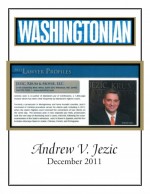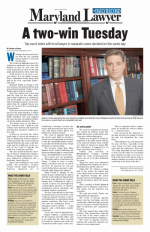Lawyers long have used focus groups or jury consultants to try to find the perfect jury for their clients. Investigating jurors fell out of favor because courts were concerned with their privacy, experts say.
But as Wi-Fi has crept into courtrooms around the country, some lawyers are taking to the Internet, searching social networks, job sites or court records to weed out problematic jurors. Advocates of the searches say it ensures fairer jury panels. In at least one state, lawyers are encouraged to perform a search of court records to make sure potential jurors have not been part of a lawsuit.
But opponents worry it might be an invasion of privacy that will make citizens more reluctant to perform their jury service.
“I go wherever Google takes me,” Jezic told Montgomery County Circuit Court Judge Richard E. Jordan last month before jury selection for the trial, which ended in a hung jury. The case will be retried this year.
Jezic, or one of his assistants, would research potential jurors during “voir dire,” the portion of a trial when lawyers and judges question potential jurors about their backgrounds or biases before deciding whether they will sit on a jury.
“There are a number of thoughts I’ve considered since this issue came up a month ago, and I knew it would come up repeatedly until we get some guidance from above,” Jordan told Jezic, referring to rulings from higher courts. Jordan denied Jezic’s request.
If allowed to do Internet research in that case, “we might have exercised more strikes,” Jezic said. “We might have known more about people we did strike, and not have struck them.”
When the issue came up in a previous trial Jordan was overseeing, it struck him as being “totally inappropriate,” he said during last month’s proceedings.
“I’ve even raised it with other judges on the bench. … There seems to be, at least from a gut level, a mixed set of views,” he said.
Montgomery County Circuit Court judges, including Jordan, declined to speak on the record about the issue.
Jezic’s and Jordan’s dilemma is one that judges and attorneys around the country are wrestling with, where technology has outstripped case law, experts say.
Some think that Internet searches of jurors’ pasts could make them less likely to take seriously rules about not relying on outside information during trials.
Jurors usually are ordered to rely only on evidence offered at trial. They should not, outside of the trial, research the case or people involved online, or try to reach out to lawyers or witnesses.
Some people consider online research a “poor man’s jury consultant,” because anyone can use it to learn information about jurors, said Thaddeus Hoffmeister, a professor of law at the University of Dayton.
No national guidelines exist about using the Internet to research jurors, said Paula Hannaford-Agor, the director of the Center for Jury Study for the National Center for State Courts, based in Williamsburg, Va.
“It varies so much, state to state, and by judge to judge,” she said. Some states provide juror names in advance and let attorneys ask jurors questions directly, whereas Maryland has a stricter voir dire process. Lawyers receive the names of potential jurors the day a trial starts.
In Missouri, she said, a court rule requires attorneys to do an Internet search on whether jurors have been party to litigation. “If they don’t, they are prohibited from raising [the issue] on appeal,” she said.
“Missouri is taking a very much ‘the tools are available, and if you don’t use it, it’s your own damn fault’ approach,” she said.
“I do think that jurors tend to be uneasy about, concerned, they’d be Googled,” Jordan said during the proceedings in Montgomery County Circuit Court last month. The websites have information, some of it wrong, that people never consented to share, such as credit histories or employment histories, he said.
“There’s a real potential for a chilling effect on jury service, by jurors, to know ‘I’m going to go out to the courthouse. … I’m going to be Googled. They’re going to find all kinds of stuff on me,’ and it feels kind of uneasy, at least,” he said.
Jezic said he began searching jurors online in the past two years or so, since Wi-Fi came to the courthouse.
“Anything else would be less than thorough,” he said.
“I never asked for permission before,” he said. “For me, there’s Wi-Fi in the courtroom. The attorney’s allowed to use iPhones, laptops. … To me, it’s self-evidently permissible.”
Attorneys receive basic information about potential jurors, according to the Montgomery County Jury Commissioner’s office. That information includes their full name, age, gender, profession, city of residence, spouse’s occupation and level of education.
Attorneys submit a more detailed list of questions to the judge overseeing the case, who asks those questions to potential jurors, Jezic said. Lawyers also may ask follow-up questions, he said.
“Through those answers, we learn a lot more about those people,” he said.
Some would-be jurors, or “mystery jurors,” as Jezic called them, don’t answer any questions, and searching for information about them online can help lawyers learn more.
It also helps lawyers learn other details that might not come out in the judge’s questions, he said.
“If there’s somebody that contributes to a body of a neighborhood watch — that generally indicates a pro-law enforcement bent. … We may not know that unless it says it on his Facebook page,” Jezic said.
“On the other hand, [if] he contributes or is on the board of the National Association of Legalizing Marijuana, we’d want to know that, too,” he said.
Montgomery County State’s Attorney John McCarthy said he knows of the practice but didn’t know of any assistant state’s attorneys using the Internet to research potential jurors.
“It’s only logical more and more people are going to do it — because the technology is there,” he said.
David Lease, another private attorney, said he has heard attorneys talk about using Google to vet jurors, but it would create more work.
“From a practical standpoint, you don’t even have the time to do that if you wanted to do so,” he said.







